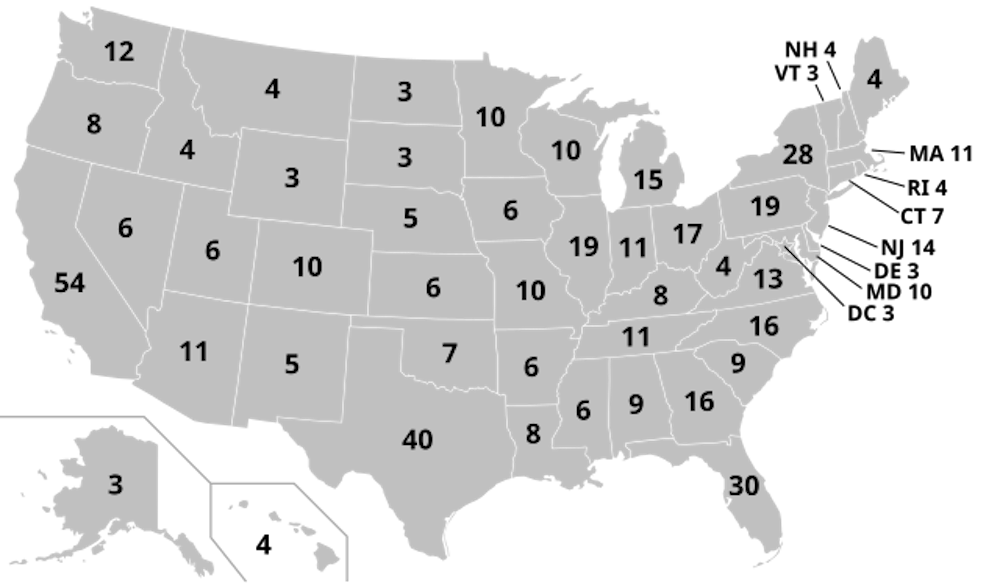By Franc Romanowski
Correspondent
The election is now less than a month away, and for many students across the College’s campus, they will be voting in their first presidential election. One of those students is Salley Salley, a junior Finance major.
“For the first time, I’ll actually be voting,” he said. “I feel good.”
However, with the Electoral College as the factor determining presidential elections, he is one of many students who feels his vote for president is not going to count.
“The biggest thing is, I feel like New Jersey is always blue,” he said. “So whether I vote or not, I feel like we’re going to win the Democrat side.”
Taking a deeper look into the Electoral College might explain Salley’s feelings.
The Electoral College is how the president and vice president of the U.S. are elected. It was put in place in 1789, when the Constitution was ratified, and was used to elect the nation’s first President George Washington and Vice President John Adams.
With the creation of America and its new system of democracy, the founding fathers lacked confidence in the American people to choose a president, political science professor Daniel Bowen said in an interview. The big fear among them: the person the people elected would try to instate themself as king.
To protect democracy, the founding fathers refused to place sole power with the American public. They needed people who, in their eyes, would be knowledgeable enough to choose the right leader. Those people would be the nation’s first electors.
And since the Electoral College is still in place today, even though New Jersey voters will be casting a vote on Nov. 5 for the next president and vice president, none of those votes are going to the candidates themselves. Instead, those votes are going to the electors of New Jersey, which have been selected prior to the upcoming general election.
“In the Constitution, it is the Electoral College voters that vote for president,” Bowen said. “We’re choosing the people that will make the decision.”
It is this Federalist-era ideology that has caused the Electoral College to become a topic of debate in recent elections.
The Electoral College no longer serves its purpose, Bowen said. There are times when the candidate who doesn’t get a majority of the votes becomes the president and “that’s a problem.”
Even though some students feel like their vote will not count, like three out of four students who were surveyed on the subject, all four believe that the Electoral College is still an effective system.
One of those four students, Salley, recognizes that the winner of the Electoral College rarely loses the popular vote.
According to USA.gov, there have only been five instances when the winner of the popular vote lost the Electoral College, the most recent being the 2016 election between Hillary Clinton and Donald Trump.
Salley also believes that the more populated states should exert influence through the amount of electoral votes they get.
But Bowen argues that these large states are not the main focus of the presidential election. In fact, he argues that a majority of the states are not going to be the focus of the presidential election.
“We still care most about Pennsylvania, and Georgia, and Michigan, and North Carolina,” he said, adding that the only way a state will matter is if it becomes competitive.
He gave the example of Texas. Assuming that the Democratic candidate won the popular vote in Texas, as well as the other states that are already blue, then the election would be biased in favor of the Democrats due to Texas’ large electoral vote count. If such a situation occurred, you would likely have both candidates focusing on Texas to gain control of their electoral votes.
“Whoever is close, those are the votes that really matter,” Bowen said of the competitive swing states. “That’s where the parties are going to compete.”
Salley is open to the idea of the popular vote being used to decide elections in certain cases.
If neither candidate reaches 270 electoral votes, then it should be the popular vote that determines the winner, not Congress, Salley said, as in the current system. If Congress votes against the winner of the popular vote, then it defeats the whole purpose of our vote.
Even if you feel as if your vote is not going to count because of the Electoral College, Bowen recommends you still vote.
While it may be true that, for president, your vote won’t matter as much in New Jersey as it would in a state like Pennsylvania, Bowen said, there are many reasons why we vote. We vote to have a say in our government and for those races where the Electoral College doesn’t play a role.
Salley is taking a similar message to heart.
“I feel like it’s my duty to vote,” he said.“Especially being the first time, I definitely want to participate in it and I think it will be an exciting new thing for me.”







